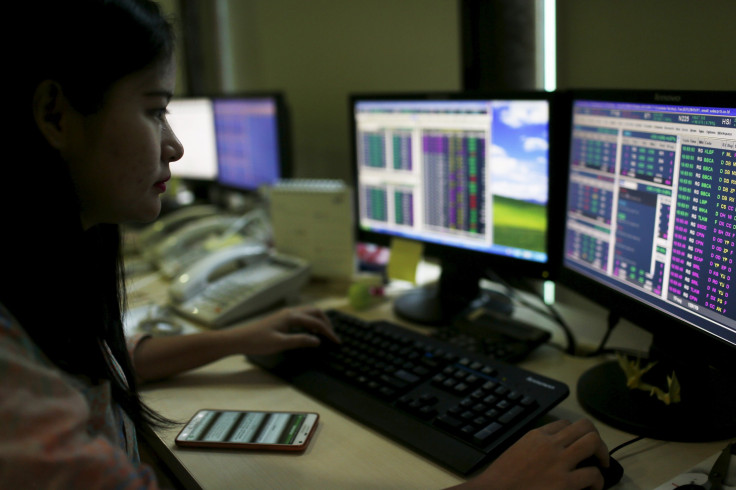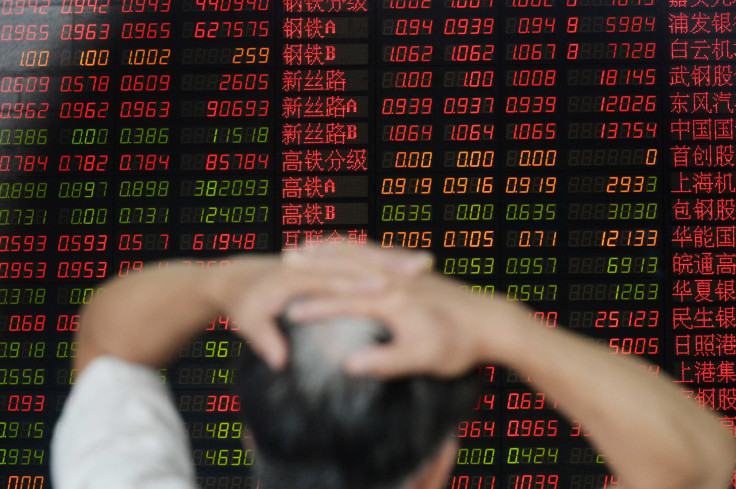Stock Market Plunge Kept Off The Front Pages As China’s Media Tries To Cool Public Criticism

SHANGHAI -- At the small café Wu Liang runs in a quiet backstreet in downtown Shanghai, it’s easy to see that China’s stock market bubble has gone distinctly flat. Just a couple of months ago, the market, which had boomed for almost a year, luring in tens of millions of new investors, was the only topic of conversation for the local men in their fifties and sixties who gather around the plain, vinyl-topped tables, to while away their afternoons chatting.
These days the men, many of them workers who were laid off or took early retirement from local state-run enterprises, seem more preoccupied with the situation in the Middle East and the rise of the Islamic State group. Wu Liang himself, who could previously be found poring over his laptop watching the latest market moves and talking up the long-term prospects for the market, now says he’s “not paying much attention.”
With China’s markets having lost 40 percent of their value since early June, some individual investors have pulled out altogether. Back in mid-July, Jane Zhang, who works for a publisher in Shanghai, told International Business Times that the falls that had wiped 20 percent off the stock market’s value in the preceding weeks would not put her off investing in the future.
“The government sees the markets as very important to the economy,” she said. “So I still have some faith in their development in the long-term.”
Now, after a further plunge of more than 20 percent in a week, Zhang has changed her tune: “I’m not in the market anymore,” she says. “I want to take a break for a while, then we’ll see.”
Yet though she says the regulation of the markets in China is not up to international standards, Zhang does not seem to blame the government for the falls, which erased most of the profit she had made during the bull run earlier in the year. She’s not angry or disappointed, she says, just baffled by the roller-coaster ride: “I really don’t quite understand what’s been going on,” she admits. “I want to try to figure out what happened before I do anything else."
And despite the turmoil, some investors still remain optimistic. Not far from Wu’s café, Zhao Jianzhong, a middle-aged newspaper vendor, says he’s been investing in the market for years, and is not going to panic now. “My investments are just sleeping,” he explains. “I’m not pulling out. I think the market’s hit its bottom -- it can’t go down much further anyway!”
Zhao is critical of some aspects of market regulation: “It’s never beneficial to us small investors,” he says. But he still believes the government will eventually ensure that the market stabilizes. “This market is all about policy -- and we still have faith in the government.” he grins.
Such attitudes may be music to the ears of China’s leaders. Some observers have accused them of making it too easy for investors to borrow money to buy shares, thus pumping up values earlier this year; while some members of the public have been critical of a commentator in the People’s Daily newspaper, who said when the market reached 4,000 points in April that this was just the start of a long bull run. (The market did peak briefly at around 5,200 points, but has been trading this week at around the 3,000 mark.)
For a government anxious about its legitimacy as China’s economy slows, avoiding a public backlash over the stock market boom and bust is important. In July the government took a series of steps to prop up the markets, injecting billions of dollars in funds, and making major brokerages promise to buy more shares, and not to sell their existing holdings.
And another of the tools the government can deploy to prevent criticism is its control of China’s media. While the Shanghai stock market’s 22 percent fall in the four trading days to this Wednesday may have made headlines around the world, it didn’t even get onto the front pages of most of China’s newspapers. Thursday’s headlines in two of Shanghai’s most popular papers, for example, focused on local education reforms -- and a new type of shatter-resistant plate glass. China’s biggest web portal, Sina.com, ran only a small story about the market volatility, halfway down its homepage.
Market coverage in many papers over recent days has been restricted to reassuring commentaries emphasizing that China’s economic fundamentals remain sound, and, on Thursday, reports of the investigation of 11 people accused of violating stock market regulations -- a story that seemed to send a message that problems in the market were the result of illegal behavior.
“I really haven’t seen much quality analysis of the stock market situation in the Chinese media,” one Chinese media expert, who asked not to be named, told IBTimes.

Hu Xingdou, a professor of economics at the Beijing Institute of Technology, agreed. “The media has to put a positive spin on things as much as possible,” he told IBTimes. “The official line is to emphasize ‘positive energy’ -- to praise more and criticize less. So even if the market is falling, they still need to say that we’re full of confidence. The mainstream media is not allowed to investigate any deeper causes of the falling market -- they may just give a few superficial reasons.”
Wednesday’s detention of a journalist from Caijing magazine, one of China’s more independently-minded financial news outlets, might discourage critical coverage even further. State media said Wang Xiaolu was accused of spreading “false information,” assumed to be a reference to a story she published in late July, which contradicted the official line by saying that the authorities might not continue with their measures to prop up the markets indefinitely.
Yet there are still critical voices on China’s Internet, which despite controls, remains more open than the official media. Shanghai-based news website The Paper, normally one of the city’s more open media outlets, aroused some cynicism from its readers Thursday morning, when it published a story about the stock market rebounding, under the headline “Market in crazy rise of 1.55 percent.”
“Today the market rose crazily 1.5 percent, the previous five days it quietly fell over 25 percent,” said the most popular comment on its website. “Crazy rise – good choice of word!” said another reader, while a third added: “If 1.55 percent is a ‘crazy rise’, we can see that The Paper’s editors really are in deep trouble.”
In response to another article on the website, in which a generally respected analyst said that there was now value and opportunity in China’s stock market, another reader accused The Paper of encouraging people to keep gambling on the markets. One added simply, “Stock market news is a joke,” while another suggested that even if the markets were starting to rise again, “the volume of transactions is fewer and fewer – we’ve all lost so much we don’t have any money left to buy [more shares].”
Yet even on this website, which tends to attract relatively critically-minded, highly educated readers, there were also views supporting the official line. One reader said foreign “negative pressure” was to blame for some of the falls on China’s markets. Academic Hu said that, overall, the majority of people in China were willing to accept relatively uncritical coverage of the markets, in part because “they’re used to it. Only a minority will really want to get to the bottom, to find out the root cause of what’s happened. Most ordinary people still trust the government, the central government in particular,” he said.
However Hu noted that people often are less confident in their local leaders, which can pose a challenge for the authorities. “The closer to the grassroots you get the less faith people have,” he said. The most recent example of this phenomenon -- and a reminder that the Chinese authorities cannot afford to be complacent about public support -- came with this month’s explosion at a chemical warehouse in Tianjin, which killed at least 145 people, with 28 reported as missing, and destroyed a large area of the city’s harbor.
The disaster aroused a wave of online criticism, significantly more virulent than that surrounding the stock market crash. In part this may have been because the market issue seemed quite complex to many observers. In the case of Tianjin, however, many ordinary people made their views clear online: they believed that the local government was covering up the number of deaths -- particularly, in the first few days, of firefighters and police.

The government responded by closing a number of small websites and social media accounts, accusing them of spreading rumors, but the debate became so powerful that even the official People’s Daily newspaper eventually criticized the Tianjin government for failing to provide clear information. According to Hu, it was a sign that the authorities were aware that in the Internet age, it was no longer possible -- or at least simply too late, in this case -- to cover up an incident of such a scale and visibility.
“In some individual incidents, the people in power see that the more you block information, the more rumors there will be,” Hu said. “They realize that this will lead to more suspicion of the authorities, and affect their credibility.”
Yet if transparency is more acceptable to the government when it comes to local officials and incidents, it seems clear that the authorities are hoping to avoid a similar degree of debate over national, macro issues such as the stock market plunge. It was perhaps significant that, while the stock market falls didn’t make China’s front pages Thursday, some newspapers headlined the news that the government had arrested a number of senior Tianjin officials for negligence related to the explosion at the port.
Nevertheless, Hu suggests that, like the Tianjin incident, the stock market drama could also leave a legacy of heightened public suspicion, in a society where even official surveys have shown that public trust of officials is low.
“Whenever some big incident occurs, whether it’s the central government or the local government that’s involved, their credibility and legitimacy are always hurt,” he said, “because officials’ instinctive reaction is always to cover up or downplay the facts -- they don’t know how to use modern methods to communicate and deal with a crisis in a more open society.”
© Copyright IBTimes 2024. All rights reserved.




















